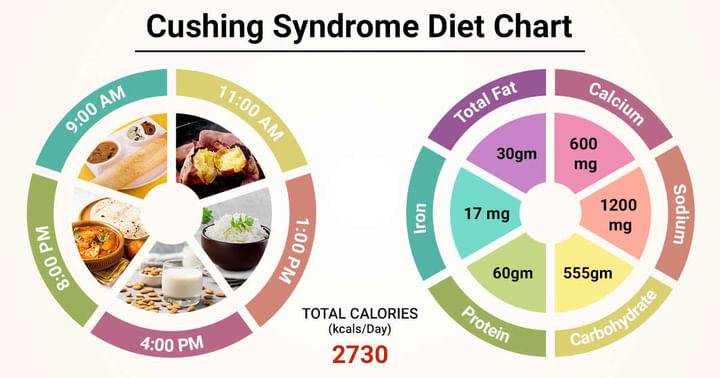Diet Chart For cushing syndrome
Last Updated: Jan 20, 2025
About
Cushing syndrome is caused when the cortisol levels of the body increase due to some external factors including steroid consumption. Having the Cushing Syndrome Diet can help reduce the levels in the body. Cushing Syndrome Diet consists of intake of proper amount of calcium through milk, cheese, broccoli and kale. Addition of calcium supplements in the daily diet with doctor’s approval can also help in maintaining the bone density and reducing the risk of osteoporosis.
Cushing Syndrome can increase the chances of high blood pressure. Reducing the amount of sodium in the diet can help control the unnecessary weight gain occuring due to fluid retention.
The syndrome majorly affects the muscle growth and lower levels of protein can lead to heavy muscle loss.The Cushing Syndrome Diet lays special emphasis on consuming protein rich food which can be achieved by eating leafy vegetables, tofu, cottage cheese, fish, yoghurt and beans. Higher cortisol levels tend to trigger the sugar levels of the body which can lead to diabetes if not controlled in time. To maintain that, the amount of carbs in the diet must be reduced and replaced by fibrous foods. Making certain lifestyle changes can also help control the Cushing Syndrome, such as doing physical exercises.
Diet Chart
| Sunday | |
| Breakfast (8:00-8:30AM) | Ragi and wheat dosa-2 +2 tsp methi chutney+1 glass milk(toned)/1 cup tea |
| Mid-Meal (11:00-11:30AM) | 1/2 cup of roasted sweet potato salad with 1 tsp olive oil |
| Lunch (2:00-2:30PM) | 1 cup parboiled rice+2 roti+1/2 cup cabbage dal+1/2 cup paneer and capsicum sabji+1 glass buttermilk |
| Evening (4:00-4:30PM) | 1 glass almond(4-5 powdered) milk(toned)+2-3 oats biscuits |
| Dinner (8:00-8:30PM) | 3 roti/ 1 cup parboiled rice+1/2 cup ridge gourd sabji+1 glass buttermilk |
| Monday | |
| Breakfast (8:00-8:30AM) | Dalia upma-1.5 cup with vegetables(potato,onion,tomato,green peas, carrot)+1 glass milk(toned)/1 cup tea |
| Mid-Meal (11:00-11:30AM) | 1 cup of apple and pineapple |
| Lunch (2:00-2:30PM) | 4 roti+100gm fish(tuna/sardine/salmon/mackerel with little olive oil)-grilled/stewed+1/2 cup rajmah curry |
| Evening (4:00-4:30PM) | 1/2 cup of beetroot, carrot and broccoli salad with 1 tsp olive oil+1 cup green tea |
| Dinner (8:00-8:30PM) | 3 multi grain roti (jowar, bajra, wheat)/ 1 cup parboiled rice+1/2 cup ivy gourd sabji+1 glass buttermilk |
| Tuesday | |
| Breakfast (8:00-8:30AM) | Oats-1/2 cup+milk(toned)-150ml |
| Mid-Meal (11:00-11:30AM) | 1 cup of orange and grape fruit salad |
| Lunch (2:00-2:30PM) | 1 cup parboiled rice+2 jowar roti+1/2 cup tomato green gram dal+1/2 cup cluster beans curry+1 glass buttermilk |
| Evening (4:00-4:30PM) | 1 small fist of peanuts,raisins,almonds,walnuts+1 cup green tea |
| Dinner (8:00-8:30PM) | 3 roti/ 1 cup parboiled rice+1/2 cup bhindi sabji+1 glass buttermilk |
| Wednesday | |
| Breakfast (8:00-8:30AM) | Idly-4+sambhar-1/2 cup+green chutney-2 tsp+1 glass milk(toned)/1 cup tea |
| Mid-Meal (11:00-11:30AM) | 1 cup of pomegranate seeds |
| Lunch (2:00-2:30PM) | 4 jowar roti+1/2 cup lauki dal+1/2 cup green peas and paneer sabji+1 glass buttermilk |
| Evening (4:00-4:30PM) | 1/2 cup of stewed tuna and leek salad+1 cup green tea |
| Dinner (8:00-8:30PM) | 3 multigrain roti (bajra, oats, ragi)/ 1 cup parboiled rice+1/2 cup snake gourd sabji+1 glass buttermilk |
| Thursday | |
| Breakfast (8:00-8:30AM) | Wheat dosa-3+2 tsp pudina chutney+1 glass milk(toned)/1 cup tea |
| Mid-Meal (11:00-11:30AM) | 1/2 cup banana and oats porridge |
| Lunch (2:00-2:30PM) | 1 cup parboiled rice+2 bajra roti+1/2 cup methi dal+1/2 cup french beans sabji+1 glass buttermilk |
| Evening (4:00-4:30PM) | 1 glass walnut milk(toned)+2-3 multigrain biscuits |
| Dinner (8:00-8:30PM) | 3 roti/ 1 cup parboiled rice+1/2 cup bittergourd sabji+1 glass buttermilk |
| Friday | |
| Breakfast (8:00-8:30AM) | Roasted oats upma-1.5 cup with vegetables(potato,onion,tomato,green peas, carrot)+1 glass milk(toned)/1 cup tea |
| Mid-Meal (11:00-11:30AM) | 1 cup of melon salad (water melon and musk melon) |
| Lunch (2:00-2:30PM) | 1 cup parboiled rice+2 roti+100gm fish(tuna/sardine/salmon/mackerel) curry+1/2 cup soya chunk and aloo sabji |
| Evening (4:00-4:30PM) | 1 glass avocado(75gm) milkshake(milk-150ml-toned) |
| Dinner (8:00-8:30PM) | 3 multi grain roti (corn flour, wheat, oats)/ 1 cup parboiled rice+1/2 cup lauki sabji+1 glass buttermilk |
| Saturday | |
| Breakfast (8:00-8:30AM) | Mushroom paratha+2 tsp green chutney+1 glass milk(toned)/1 cup tea |
| Mid-Meal (11:00-11:30AM) | 1 glass of Mixed berry (strawberry, blue berry, black berry) and mint juice |
| Lunch (2:00-2:30PM) | 4 roti+1/2 cup palak dal+1/2 cup black eyebean sabji+1 glass buttermilk |
| Evening (4:00-4:30PM) | 100gm of baked avocado with celery and lettuce |
| Dinner (8:00-8:30PM) | 3 roti/ 1 cup parboiled rice+1/2 cup cauliflower sabji+1 glass buttermilk |
Food Items To Limit
- Trans Fat
- Vegetable & Seed Oil
- Fruit Juice
- Foods you are sensitive to
- Chocolate Cake
- Fat Free Flavoured Yogurts
- Alcohol
- Low Fibre Carbs
- Caffeine
Do's And Dont's
Do's & Don'ts:
- Beware of too much sodium : Excess sodium can affect your blood pressure, cause swelling, and make you gain weight. So, try to follow these tips: Don’t add extra salt to your food & Avoid food that is prepared with added salt.
- People with Cushing’s disease often develop osteoporosis (fragile bones). Calcium and vitamin D can be important in strengthening bones.
- Try to keep cholesterol in check : Cushing’s disease can cause cholesterol levels to go up. So you should try to limit your intake of fatty foods and eat dairy products (such as milk and cheese) that are low in fat.
- High blood sugar may require special dietary changes : Cushing’s disease can also cause high blood sugar levels (called hyperglycemia). If this happens, special medicine and a special diet may be needed
Food Items You Can Easily Consume
- Healthy fats and omega-3 fatty acids — Cold-water, wild-caught fish like salmon or sardines can reduce inflammation and help stabilize moods. Healthy fats support brain health and allow us to make important hormones. Aside from seafood, include nuts/seeds, avocado, olive oil and coconut oil in your diet regularly.
- Foods high in B vitamins — We need B vitamins in order convert nutrients to energy and to support brain functions. Include raw or cultured dairy products, cage-free eggs, grass-fed beef, wild-caught fish, poultry, brewer’s yeast, and green leafy vegetables in your meals.
- Foods with calcium, potassium and magnesium — Electrolytes are natural muscle relaxers and important for overall health. They also help lower symptoms like headaches, trouble sleeping, aches, high blood pressure and more. Try eating more unsweetened organic yogurt, wild-caught salmon, beans/legumes, leafy green veggies, cruciferous veggies like broccoli, avocados and nuts to prevent an electrolyte imbalance.
- High-protein foods — Foods with protein provide amino acids that are needed for proper neurotransmitter functions, while also helping to control appetite and fighting fatigue.
References
- Cushing’s Disease Diet- Cushing’s Disease News News [Internet]. cushingsdiseasenews.com [Cited 06 August 2019]. Available from:
- Leal-Cerro A, Venegas E, Garcia-Pesquera F, Jimenez LM, Astorga R, Casanueva FF, Dieguez C. Enhanced growth hormone (GH) responsiveness to GH-releasing hormone after dietary restriction in patients with Cushing's syndrome. Clinical endocrinology. 1998 Jan;48(1):117-21. [Cited 08 August 2019]. Available from:
- Jessica B. Cushing's Syndrome Diet. 2019 [Internet]. livestrong.com. [Cited 01 July 2019]. Available from:
Table of content
Find Dietitian/Nutritionist near me
Ask a free question
Get FREE multiple opinions from Doctors



